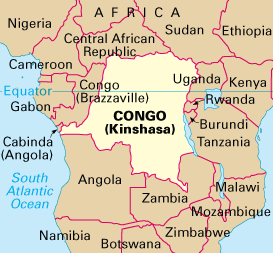Citizens Get By in Congo’s Kinshasa Despite Dysfunctional Government
 People in the affluent West often condescendingly look down on Third World countries, but National Geographic Magazine‘s Robert Draper has discovered that such prejudice is unfounded.
People in the affluent West often condescendingly look down on Third World countries, but National Geographic Magazine‘s Robert Draper has discovered that such prejudice is unfounded.
Impoverished and dysfunctional cities actually have their own exuberance, he says: “We are in the quickening heart of Kinshasa, the capital of the Democratic Republic of the Congo—where metrics like per capita nutrition levels and water quality would suggest a near-death state of being. In fact, Kinshasa is all too alive.”
All of the problems that Americans find wrong with now-bankrupt Detroit pale when compared with that African city: “Kinshasa seethes like primordial ooze across a 250-square-mile patch of tropics on the south bank of the Congo River. Some ten million live in what the Belgian colonizers once called Léopoldville, and each year another half million join Kinshasa’s population. How they will survive is anyone’s guess.”
Draper describes the government infrastructure of Kinshasa in terms that would horrify the average American: “Despite its status as the capital city of the second largest country in all of Africa, Kinshasa is a marvel of dysfunction. Each of the government ministries has to be, as one U.S. official tactfully puts it, ‘basically self-financing’—meaning much of the money it has is generated by bribery and extortion. This is especially true of the police, who, says the aid adviser, ‘are one hundred percent on the take. Every one of them is an officer for one reason: to collect for himself.’”
Kinshasa seems to be what Detroit could become if it were to slide further into poverty, but people find ways of adapting and making the most of their predicament, which seems normal and fulfilling in its own way:
 You would be right to expect anarchy from this collision of burgeoning poverty and state failure. But the West’s faith in institutions happens to be irrelevant in this slapdash confluence of metropolis and village. Nor is Kinshasa’s story the familiar African tale of woe, oppression, and no way out.
You would be right to expect anarchy from this collision of burgeoning poverty and state failure. But the West’s faith in institutions happens to be irrelevant in this slapdash confluence of metropolis and village. Nor is Kinshasa’s story the familiar African tale of woe, oppression, and no way out.
Having first gained independence in 1960 from their Belgian colonizers, who left behind no governing capacity to speak of, and having then been deceived and plundered by the dictator Mobutu Sese Seko, the Congolese have long since discarded expectations that their civil institutions and elected leaders will perform as promised. The miracle of Kinshasa is that it has not discarded hope along the way. On the contrary: This is a city of frenzied entrepreneurship, where everyone is a salesman of whatever merchandise comes along, an uncertified specialist—self-employed, self-styled—a creator amid chaos, an artist in a shed.
Draper’s observations call into question our snobbish, diversity-intolerant tendency to look down on lifestyles that are different from our own. Material well-being doesn’t necessarily bring happiness, not does government administration that effectively reduces self-reliance to almost nothing. The people of Kinshasa adapt to a Darwinian world where the weakest aren’t just statistical projections and objects of pity. Rather, the weak are those who aren’t street smart and able to defend themselves without the aid of government:
Because the raw and rich tableau of Kinshasa’s compulsive entrepreneurship can quickly darken. These things happened to me and could just as easily happen to you: You will be in an SUV driving through Matonge, and suddenly a man will jump onto the running board of your car. He will bang on the window. He will say that your car sideswiped his and that he demands immediate compensation. Your guide will deny this and accelerate the vehicle. The man will hang on, mile after mile, until a traffic cop witnesses the situation and signals for you to pull over—and will also demand money. If your guide does not happen to have the cell number of the chief of police, as ours did, then you will spend the next several hours in a state of detention until you agree to cough up sufficient money to ensure your freedom.”
 People in the affluent West often condescendingly look down on Third World countries, but National Geographic Magazine‘s Robert Draper has discovered that such prejudice is unfounded.
People in the affluent West often condescendingly look down on Third World countries, but National Geographic Magazine‘s Robert Draper has discovered that such prejudice is unfounded.  You would be right to expect anarchy from this collision of burgeoning poverty and state failure. But the West’s faith in institutions happens to be irrelevant in this slapdash confluence of metropolis and village. Nor is Kinshasa’s story the familiar African tale of woe, oppression, and no way out.
You would be right to expect anarchy from this collision of burgeoning poverty and state failure. But the West’s faith in institutions happens to be irrelevant in this slapdash confluence of metropolis and village. Nor is Kinshasa’s story the familiar African tale of woe, oppression, and no way out.